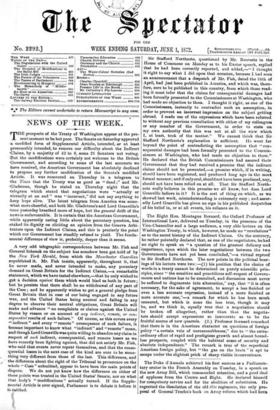A very odd telegraphic correspondence between Mr. Fish and General
Schenck on the subject has somehow been got hold of by the New York Herald, from which the Manchester Guardian +republished it. Mr. Fish insists, apparently, throughout it, that he never made, and never intended to make, any pecuniary demand on Great Britain for the Indirect Claims,—a remarkable statement, which we have tested elsewhere,—that he only wished to ,get a decision against them which would bind us both in future ; but be persists that there shall be no withdrawal of any part of the Case ; and he apparently wishes to get a general pledge from Great Britain that in case of our being engaged in any future war, and the United States being neutral and failing in any degree to observe their neutral obligations, Great Britain will make aud advance "no complaints or claims against the United States by reason or on account of any indirect, remote, or con- seguential results of such failure." Of course, as this covers every " indirect " and every "remote" consequence of such failure, it became important to know what "indirect" and "remote" mean, and though Lord Granville was quite willing to abandon any claim in respect of such indirect, consequential, and remote losses as we have recently been fighting against, that did not satisfy Mr. Fish, who said that events never repeat themselves, and that the conse- quential losses in the next case of the kind are sure to be some- thing very different from those of the last. This difference, and the difference about the right of the Tribunal to pronounce on the whole " Case " submitted, appear to have been the main points of dispute. We do not yet know bow the difference on either of these points was treated in the United States' Senate, nor on what that body's " modifications " actually turned. If the Supple- mental Article is ever signed, Parliament is to debate it before it is ratified.


































